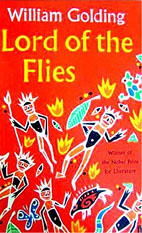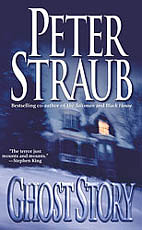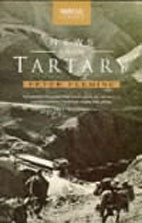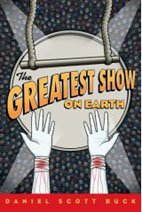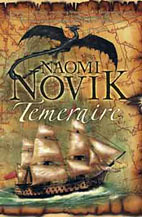Going Postal - Terry Pratchett
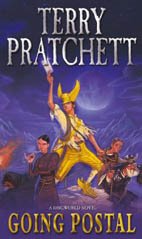
Before I discovered the joy of Goodkind-bashing, I hadn't really heard much about Ayn Rand, beyond a vague mental image of some shrill old Russian-American harridan, some Simpsons gags and a line in a Paul Simon song. Objectivism never made much headway this side of the Atlantic, which is why it's slightly odd that Pratchett chose to ridicule it in Going Postal - like most Brits, I missed the references on my first read, and had to go back once I found out I might appreciate more of the jokes.
Going Postal is the tale of the Ankh-Morpork Post Office, belatedly revived by the Patrician after a long period of inactivity. It seems a strange time to be doing this, as the semaphore technology of the "Clacks" now spans the continent, making a postal service somewhat redundant - however, this turns out to be a cunning plan to break the monopoly of the new clacks magnates, whose corrupt practices have made the service unreliable, expensive and downright dangerous to its operators. To this end, the unfortunately-named ex-conman Moist von Lipwig has been dragooned into the role of Postmaster; he will have to brave the dark mysteries of the Post Office interior, somehow expose the magnates' corruption, and avoid getting killed in a number of interesting ways...
The main storyline is fine and good, but unfortunately it doesn't stretch to an entire book, which means that Pratchett has had to pad it out with crappy tiny subplots which try to take up more space than they deserve. Nasty assassin Mr Gryle and the quantum sorting machine are both very lame inventions that could easily have been left out with no detriment to the plot, or reduced to comic cameos to avoid clutter, but as it stands they just make the story look messy. The same with the talking letters, which seem to be little more than a long build-up to a disappointing punchline. One thing Pratchett used to be very good at was the little setpiece gags that sat just to the side of the plot, but now they seem to be getting too big for themselves and interfering with the action, while not actually being that funny.
The Objectivist references are provided by a Mr Reacher Gilt, business leader and lover of freedom, who resents the governmental interference into his private business of extortion and embezzlement. While the idea of a comic fantasy novel about telecoms regulation is pretty funny (that's sort of my job), the satire is fairly heavy-handed; Moist's constant musings about "the freedom to take the consequences" do labour the point somewhat. Biting social comment it ain't - as comic creations, the other blundering buffoons of businessmen work a lot better. There's some more preachiness, too, in the character of Adora Belle Dearhart, the waspish Janeane Garofolo-esque love interest, whose smoking habit repeatedly and unnecessarily disgusts Moist - just say no, kids!
Again, I seem to have given Pratchett a scathing review, but I did enjoy the book. Are my expectations too high? Am I just trying to punish the guy for not being as good as he used to be? Or just overreacting to the fawning hype that surrounds his every missive? Not consciously, that's for certain, and that's the best I can do. The book is very good in places, and the ending is excellent, but much of it really annoyed me, which I don't find with his older books. Still, once you get through the teeth-grinding moments, it's still worth reading.
7/10


